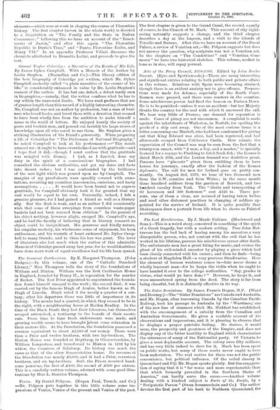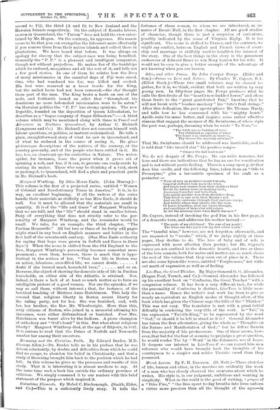The Sister Dominions. By James Francis Hogan, M.P. (Ward and
Downey.)—The " Sister Dominions" are Canada and Australia, and Mr. Hogan, after traversing Canada by the Canadian Pacific Railway, took his passage to Australia by the Warrimoo,' one of the new line of steamers which Mr. Huddart has established, with the encouragement of a subsidy from the Canadian and Australian Governments. He gives a readable account of his observations and impressions, and it is pleasing to observe that he displays a proper patriotic feeling. He desires, it would seem, the prosperity and greatness of the Empire, and does not display any of the bitter hostility to England which characterises the utterances of many of the Nationalist party. Of Victoria he gives a most deplorable account. The colony owes fifty millions, and has very little indeed to show for it. Much has been spent on public works, but many of these works never ought to have been undertaken. The real motive for them was not the public convenience, but political influence. Of the veiled slavery in Queensland and Fiji Mr. Hogan speaks plainly. But the exaggera- tion of saying that it is " far worse and more reprehensible than that which formerly prevailed in the Southern States of America," can hardly serve the cause.—Another volume dealing with a kindred subject is Parts of the Pacific, by a "Peripatetic Parson" (Swan Sonnenschein and Co.) The author devotes the first part of his book to Northern Queensland, the
second to Fiji, the third (A and B) to New Zealand and the Hawaian Islands respectively. On the subject of Kanaka labour, as seen in Queensland, the " Parson" does not hold the view enter- tained by Mr. Hogan. On the contrary, he approves. His reason seems to be that you can evangelise the labourers more.effectually if you remove them from their native islands and collect them in plantations. We have heard that before. It was always an apology for slavery that the subject-race was being benefited. Generally the "P. P." is a pleasant and intelligent companion, though not without prejudices. He makes fun of the hardships which he endured, mosquitoes and all the rest of it, and tells not a few good stories. In one of them he relates how the lives of many missionaries in the cannibal days of Fiji were saved. One, who had wandered too far, was killed and cooked. His feet were reserved as a bonne bouche for the King, but the nailed boots had not been removed,—the chef thought them part of the man. The King broke a tooth on one of the nails, and forthwith issued an edict that " throughout his dominions no more hob-nailed missionaries were to be eaten." On Hawaian politics the " P. P." has strong opinions. The new Republic, founded on the deposition of Queen Liliuokalani, he describes as a "bogus company of Sugar filibusters."—A third volume which may be mentioned along with these is Travel and Adventure in. Northern. Queensland, by Arthur C. Bicknell (Longman and Co.) Mr. Bicknell does not concern himself with labour questions, or politics, or matters ecclesiastical. He tells a plain, straightforward story of what he saw in Queensland, and of what he endured in the course of seeing it. He gives picturesque descriptions of the natives, of the scenery, of the country generally, and of the people who have settled in it. He has, too, an observant eye for curiosities in Nature. The water- spider, for instance, loses the power when it grows old of spinning a web, and has, if it can, to procure one ready-made by ousting its maker. Those who may be thinking of a visit, short or prolonged, to Queensland, will find a plain and practical guide in Mr. Bicknell's book.



















































 Previous page
Previous page